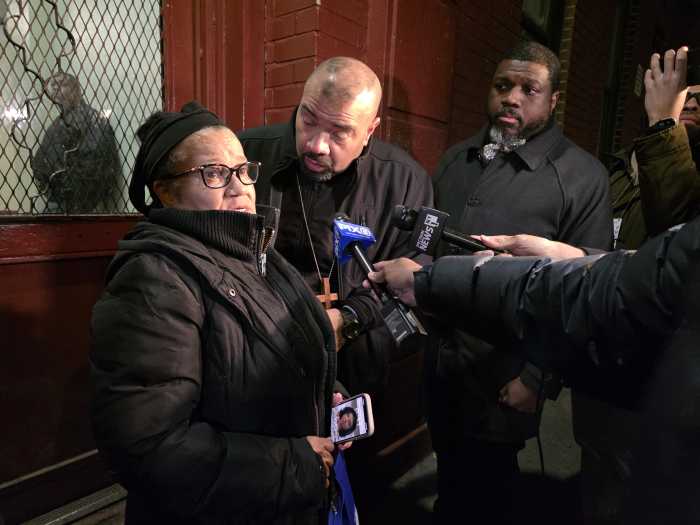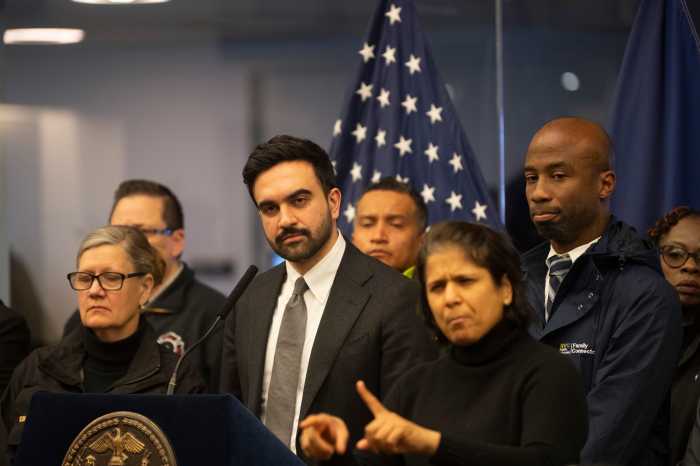BY ARTHUR S. LEONARD | The Supreme Court’s same-sex marriage decision was not the only case of consequence for LGBT rights decided on June 26. On the opposite coast, a three-judge panel of the Ninth Circuit Court of Appeals in San Francisco unanimously revived a California inmate’s lawsuit seeking sex reassignment surgery. That case had earlier been dismissed at the screening stage by Chief Judge Ralph R. Beistline of California’s Eastern District Court.
Mia Rosati is a California prison inmate, incarcerated under the name Philip Walker Rosati for the murder of her wife, who identifies as a transgender woman but has not been formally diagnosed with gender dysphoria. Prison officials have refused even to allow her to be examined by a doctor qualified to diagnose gender dysphoria, which would be a prerequisite to receiving the treatment she seeks.
According to Rosati’s allegations, despite knowing about her symptoms — “including repeated efforts at self-castration” — prison officials “recklessly disregarded an excessive risk to her health by denying [sex-reassignment surgery] solely on the recommendation of a physician’s assistant with no experience in transgender medicine.”
Ninth Circuit says valid Eighth Amendment claim raised
In response to her appeal of the case’s dismissal, the state has acknowledged it has never provided such surgery to an inmate. Evidence in another recent federal case suggests that the California Department of Corrections maintains a blanket policy against providing such surgery for inmates.
Rosati originally filed her complaint representing herself, and Judge Beistline, in “screening” it, dismissed it permanently, not even allowing her to respond with an amended complaint. She subsequently obtained representation from Lambda Legal’s Los Angeles office and the Prison Law Office in Berkeley, who filed her appeal.
Federal courts have ruled that prison inmates whose serious medical conditions are met by deliberate indifference from prison officials have a claim under the Eighth Amendment, which forbids cruel and unusual punishment. The battle for transgender inmates has been to establish that gender dysphoria is a serious medical condition and that sex-reassignment surgery may qualify as medically necessary.
There is an emerging consensus among most federal courts that psychological counseling, hormone therapy, and modifications to an inmate’s living conditions involving dress and grooming may qualify as medically necessary, but the courts are still at early stages in accepting the proposition that prison systems should be required to provide sex-reassignment surgery. No state inmate has ever received such surgery as a result of a federal court order.
The Ninth Circuit panel found that Beistline erred in screening out and dismissing this complaint, finding that his action could only be justified if it was “absolutely clear that the deficiencies of the complaint could not be cured by amendment.” The state’s attorneys, in fact, conceded that Beistline should have provided Rosati with an opportunity to amend her complaint, so reversal of his dismissal was virtually mandated. But the court went further, stating that “even absent the concession, we conclude that the complaint, although not drafted with the skill and brevity expected of counsel, stated an Eighth Amendment claim upon which relief could be granted.”
In arguing that she suffered from severe gender dysphoria for which sex-reassignment surgery was necessary treatment, Rosati quoted at length from the Standards of Care published by the World Professional Association for Transgender Health.
“Rosati plausibly alleges that prison officials were aware of her medical history and need for treatment, but denied the surgery because of a blanket policy against SRS,” the panel found. In the past, the Ninth Circuit has ruled that a “blanket, categorical denial of medically indicated surgery” is “the paradigm of deliberate indifference.”
The court also noted Rosati’s allegation that treatment was denied based on a recommendation from an unqualified physician’s assistant. “Although Rosati lacks a medical opinion recommending SRS, she plausibly alleges that this is because the state has failed to provide her access to a physician competent to evaluate her,” the court found, noting that this, too, could be construed as deliberate indifference.
“We express no opinion on whether SRS is medically necessary for Rosati or whether prison officials have other legitimate reasons for denying her that treatment,” the court found. “But, like other courts that have considered similar actions, we hold that the allegations in Rosati’s complaint are sufficient to state a claim.”
The Ninth Circuit panel cited decisions from the First, Fourth, and Seventh Circuits supporting its conclusion, though in none of those cases did a court ultimately order prison officials to provide sex-reassignment surgery. The panel also cited a March ruling by another California federal district court judge, who ordered sex-reassignment surgery for Michelle-Lael Norsworthy to be undertaken immediately, only to have the order stayed by the Ninth Circuit in response to the state’s emergency motion. This panel’s ruling on Rosati’s appeal may foreshadow how another panel of the court will deal with that case.
The Rostai panel, having found that her complaint was sufficient to state an Eighth Amendment claim, also commented that the district court should consider her claim that the state was violating her 14th Amendment right to equal protection.
If the Ninth Circuit ultimately rules in favor of one of the two transgender inmates whose cases are before it, the chances are excellent that the state could obtain review from the Supreme Court. On May 4, the Supreme Court denied review in Kosilek v. Spencer, in which the full bench of the First Circuit rejected a three-judge panel and a trial judge ruling and allowed Massachusetts prison officials to deny sex-reassignment surgery to Michelle Kosilek. If the Ninth rules the other way, the high court would face a split between two federal circuits, paving the way for it to consider the issue. The Supreme Court has never previously ruled on whether gender dysphoria is a serious medical condition or if prison officials may be required to provide for medically-necessary sex-reassignment surgery.
Mia Rosati is represented on appeal by Jon W. Davidson and Peter C. Renn of Lambda Legal and Alison Hardy of the Prison Law Office. Renn argued the appeal in the Ninth Circuit. The World Professional Association filed an amicus brief in support of Rosati’s appeal.



































